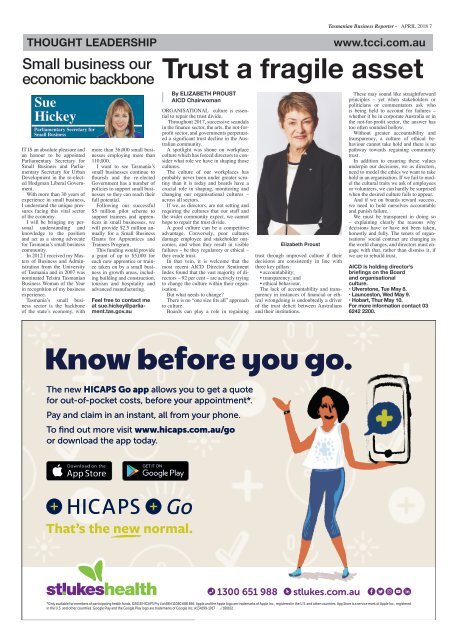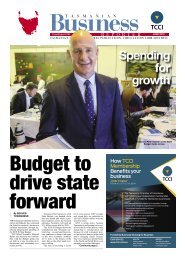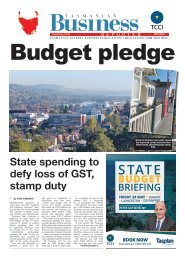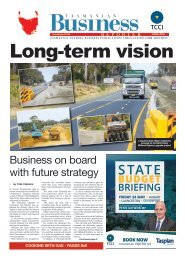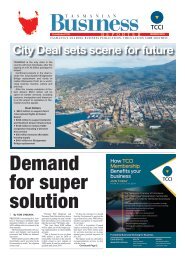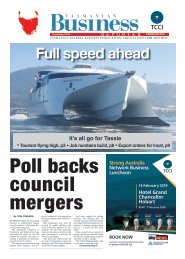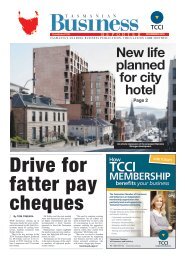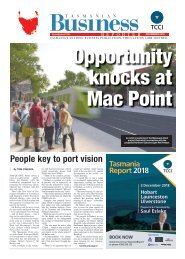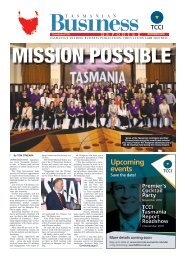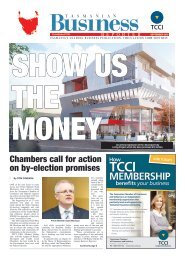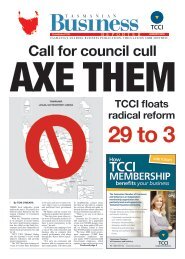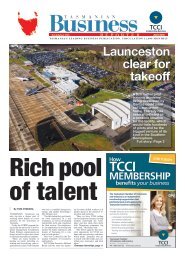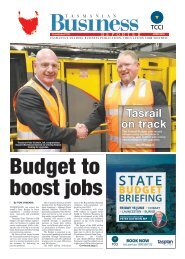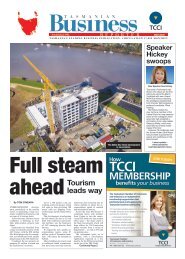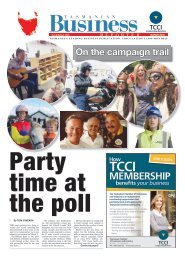Tasmanian Business Reporter April 2018
This month, you'll read how Tasmanian business leaders have welcomed the re-elected Liberal Government's mandate to continue revitalising the state's economy. You'll also find details about a $3 million research grant for the Australian Maritime College, St.LukesHealth taking home a prestigious customer satisfaction award and Tasmania's Defence Advocate being bestowed with the US Military's highest honour for a non-US citizen.
This month, you'll read how Tasmanian business leaders have welcomed the re-elected Liberal Government's mandate to continue revitalising the state's economy.
You'll also find details about a $3 million research grant for the Australian Maritime College, St.LukesHealth taking home a prestigious customer satisfaction award and Tasmania's Defence Advocate being bestowed with the US Military's highest honour for a non-US citizen.
You also want an ePaper? Increase the reach of your titles
YUMPU automatically turns print PDFs into web optimized ePapers that Google loves.
<strong>Tasmanian</strong> <strong>Business</strong> <strong>Reporter</strong> - APRIL <strong>2018</strong> 7<br />
THOUGHT LEADERSHIP<br />
Small business our<br />
economic backbone<br />
Sue<br />
Hickey<br />
Parliamentary Secretary for<br />
Small <strong>Business</strong><br />
IT IS an absolute pleasure and<br />
an honour to be appointed<br />
Parliamentary Secretary for<br />
Small <strong>Business</strong> and Parliamentary<br />
Secretary for Urban<br />
Development in the re-elected<br />
Hodgman Liberal Government.<br />
With more than 30 years of<br />
experience in small business,<br />
I understand the unique pressures<br />
facing this vital sector<br />
of the economy.<br />
I will be bringing my personal<br />
understanding and<br />
knowledge to the position<br />
and act as a strong advocate<br />
for Tasmania’s small business<br />
community.<br />
In 2012 I received my Masters<br />
of <strong>Business</strong> and Administration<br />
from the University<br />
of Tasmania and in 2007 was<br />
nominated Telstra <strong>Tasmanian</strong><br />
<strong>Business</strong> Woman of the Year<br />
in recognition of my business<br />
experience.<br />
Tasmania’s small business<br />
sector is the backbone<br />
of the state’s economy, with<br />
more than 36,000 small businesses<br />
employing more than<br />
110,000.<br />
I want to see Tasmania’s<br />
small businesses continue to<br />
flourish and the re-elected<br />
Government has a number of<br />
policies to support small businesses<br />
so they can reach their<br />
full potential.<br />
Following our successful<br />
$5 million pilot scheme to<br />
support trainees and apprentices<br />
in small businesses, we<br />
will provide $2.5 million annually<br />
for a Small <strong>Business</strong><br />
Grants for Apprentices and<br />
Trainees Program.<br />
This funding would provide<br />
a grant of up to $5,000 for<br />
each new apprentice or trainee<br />
taken on by a small business<br />
in growth areas, including<br />
building and construction,<br />
tourism and hospitality and<br />
advanced manufacturing.<br />
Feel free to contact me<br />
at sue.hickey@parliament.tas.gov.au<br />
www.tcci.com.au<br />
Trust a fragile asset<br />
By ELIZABETH PROUST<br />
AICD Chairwoman<br />
ORGANISATIONAL culture is essential<br />
to repair the trust divide.<br />
Throughout 2017, successive scandals<br />
in the finance sector, the arts, the not-forprofit<br />
sector, and governments perpetuated<br />
a significant trust decline in the Australian<br />
community.<br />
A spotlight was shone on workplace<br />
culture which has forced directors to consider<br />
what role we have in shaping those<br />
cultures.<br />
The culture of our workplaces has<br />
probably never been under greater scrutiny<br />
than it is today and boards have a<br />
crucial role in shaping, monitoring and<br />
changing our organisational cultures –<br />
across all sectors.<br />
If we, as directors, are not setting and<br />
requiring the cultures that our staff and<br />
the wider community expect, we cannot<br />
hope to repair the trust divide.<br />
A good culture can be a competitive<br />
advantage. Conversely, poor cultures<br />
damage employee and stakeholder outcomes,<br />
and when they result in visible<br />
failures – be they regulatory or ethical –<br />
they erode trust.<br />
In that vein, it is welcome that the<br />
most recent AICD Director Sentiment<br />
Index found that the vast majority of directors<br />
– 92 per cent – are actively trying<br />
to change the culture within their organisation.<br />
But what needs to change?<br />
There is no “one size fits all” approach<br />
to culture.<br />
Boards can play a role in regaining<br />
Elizabeth Proust<br />
trust through improved culture if their<br />
decisions are consistently in line with<br />
three key pillars:<br />
• accountability;<br />
• transparency; and<br />
• ethical behaviour.<br />
The lack of accountability and transparency<br />
in instances of financial or ethical<br />
wrongdoing is undoubtedly a driver<br />
of the trust deficit between Australians<br />
and their institutions.<br />
These may sound like straightforward<br />
principles – yet when stakeholders or<br />
politicians or commentators ask who<br />
is being held to account for failures –<br />
whether it be in corporate Australia or in<br />
the not-for-profit sector, the answer has<br />
too often sounded hollow.<br />
Without greater accountability and<br />
transparency, a culture of ethical behaviour<br />
cannot take hold and there is no<br />
pathway towards regaining community<br />
trust.<br />
In addition to ensuring these values<br />
underpin our decisions, we as directors,<br />
need to model the ethics we want to take<br />
hold in an organisation. If we fail to model<br />
the cultural traits we ask of employees<br />
or volunteers, we can hardly be surprised<br />
when the desired culture fails to appear.<br />
And if we on boards reward success,<br />
we need to hold ourselves accountable<br />
and punish failure.<br />
We must be transparent in doing so<br />
– explaining clearly the reasons why<br />
decisions have or have not been taken,<br />
honestly and fully. The tenets of organisations’<br />
social contract are changing as<br />
the world changes, and directors must engage<br />
with that, rather than dismiss it, if<br />
we are to rebuild trust.<br />
AICD is holding director’s<br />
briefings on the Board<br />
and organisational<br />
culture.<br />
• Ulverstone, Tue May 8.<br />
• Launceston, Wed May 9.<br />
• Hobart, Thur May 10.<br />
For more information contact 03<br />
6242 2200.<br />
Know before you go.<br />
The new HICAPS Go app allows you to get a quote<br />
for out-of-pocket costs, before your appointment*.<br />
Pay and claim in an instant, all from your phone.<br />
To find out more visit www.hicaps.com.au/go<br />
or download the app today.<br />
1300 651 988 stlukes.com.au<br />
*Only available for members of participating health funds. ©<strong>2018</strong> HICAPS Pty Ltd ABN 11080 688 866. Apple and the Apple logo are trademarks of Apple Inc., registered in the U.S. and other countries. App Store is a service mark of Apple Inc., registered<br />
in the U.S. and other countries. Google Play and the Google Play logo are trademarks of Google Inc. A134199-1017 180102


